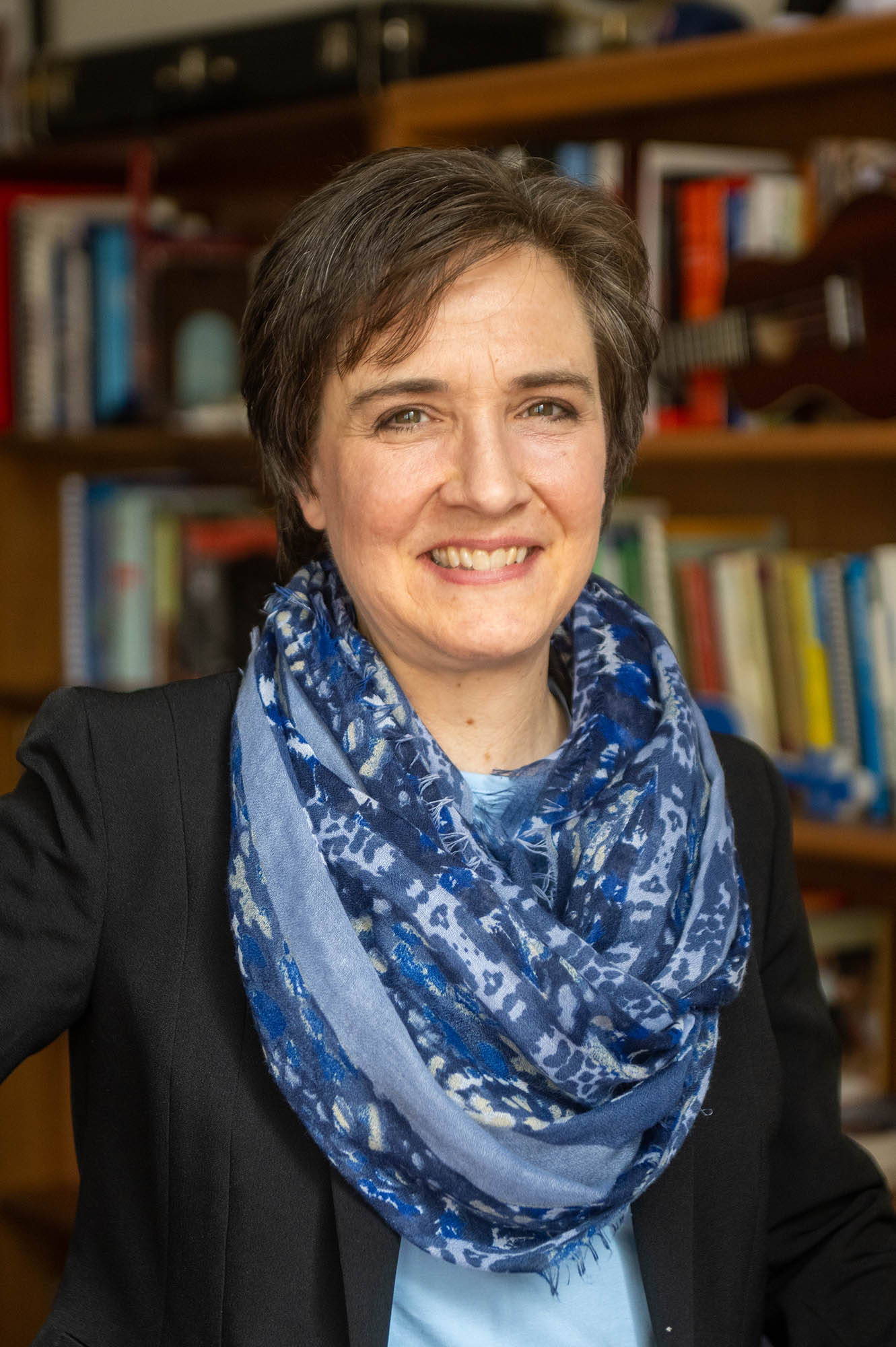CFA’s Karin Hendricks to Receive the 2023 Metcalf Cup and Prize, BU’s Highest Teaching Honor

Karin Hendricks has earned BU’s highest teaching honor, the Metcalf Cup and Prize, for a teaching philosophy based on the idea that every student has their own pathway to success.
CFA’s Karin Hendricks to Receive the 2023 Metcalf Cup and Prize, BU’s Highest Teaching Honor
Associate professor of music education cited for transforming her department by modeling the highest standard of teaching excellence
This article was first published in BU Today on May 17, 2023. By Joel Brown. Photo by Cydney Scott
Excerpt
In most music education, Karin Hendricks says, there’s traditionally been one “right” way to teach.
“Someone comes in and they’re the ‘master teacher’ and they’re expected to have all the answers,” she says. “And, historically, students have been expected to listen. And if they didn’t get it, then they were deemed not talented. That’s the old-school approach.”
Hendricks does it differently, with what she calls compassionate music teaching.
The key is “an assumption that every student is capable, but has a different pathway,” she says. “Not only to success, but to their own version of success. So, we don’t even all have the same finish line. And a compassionate music teacher is attuned to students’ needs, interests, and pathways to get where they want to be.”
A College of Fine Arts associate professor and chair of music education, Hendricks has been named this year’s winner of the Metcalf Cup and Prize, the University’s highest award for teaching, to be presented at BU’s Commencement on Sunday, May 21.
She “has transformed the Department of Music Education mainly in response to the high standards of teaching excellence she models for her colleagues—both as a faculty member and now as department chair,” Gregory Melchor-Barz, director of CFA’s School of Music and a professor of music, musicology/ethnomusicology, wrote in support of her Metcalf nomination. “The department is now considered nationally and internationally as one of the top music education programs for undergraduate and graduate study.”
Hendricks, president-elect of the American String Teachers Association, is the author of Compassionate Music Teaching: A Framework for Motivation and Engagement in the 21st Century(Rowman & Littlefield, 2017). The chapter titles offer a hint at her approach: “Trust.” “Empathy.” “Patience.” “Community.” “Authentic Connection.”
The book “is really about students,” she writes in the introduction. “It is about inspiring them, motivating them, connecting with them, listening to them, hearing them.”
“Even if we’re all learning the same song,” she says in an interview, “not everyone is going to learn that song in the same way. Some people are really tactile learners and need to have that guitar in their hand. Whereas other people need to hear it on YouTube multiple times. Whereas other people need to sing it. Other people need to write it down. And so if I’m teaching everyone with my own learning style, then that only helps the people who are like me.”
[Karin] has transformed the Department of Music Education mainly in response to the high standards of teaching excellence she models for her colleagues—both as a faculty member and now as department chair. The department is now considered nationally and internationally as one of the top music education programs for undergraduate and graduate study.
Her way can require a teacher to improvise when a student is not doing well.
“If I’m teaching an orchestra, for instance, I might say, ‘Hey, let’s play this scale together, and let’s have [someone else] lead the scale. And I walk around, and I just lean over—and I could even be like, you know, acting like I’m fixing something—and say, ‘Hey, it seems like, you know, do you need some time to yourself? What’s going on? Should we talk after class?’ Because there’s no reason to belittle or shame someone, ever. Whether it’s in front of other people or not.”
Hendricks is a cellist and began her career as a string teacher. She previously taught at the University of Illinois and Ball State University before arriving at Boston University in 2015. Prior to working in higher education, she was a public school orchestra leader for 13 years. She was named Secondary Teacher of the Year for the Utah Chapter of the American String Teachers Association.
Hendricks’ Metcalf nomination came about because of the shared determination of three music education students she has taught or mentored to see her recognized. Undergraduate Delaney Finn (CFA’24), master of music student Cheryl Freeze (CFA’23), and doctoral student Lily Lung-Grant (CFA’23) got together via email to recommend her.
Lung-Grant says having Hendricks as her dissertation adviser over two and a half years made her a fan. Hers is a “very nontraditional” dissertation about the experiences of immigrant students in music programs in the United States, and Hendricks strongly supported her approach. “Right away, I was thinking, ‘Wow, she could be a very interesting adviser, because she’s not going to tell me what to do,” Lung-Grant says. “She’s going to ask me what I want to do. It’s just a very empowering and enjoyable learning experience with her.”

Music Education at BU
Situated in a top research institution, the Music Education program at Boston University School of Music uniquely provides students the opportunity to develop artistry and scholarship in the context of an academic epicenter in the vibrant, cultural city of Boston.
A student-centered program committed to diversity, equity, and inclusion, the Music Ed program at BU emphasizes cutting-edge, research-based pedagogy while prioritizing opportunities for students to engage in various music teaching and learning contexts. With acclaimed faculty who serve in national and international leadership positions and author and edit publications, the Music Ed program is deeply connected to and influences contemporary practice around the world.